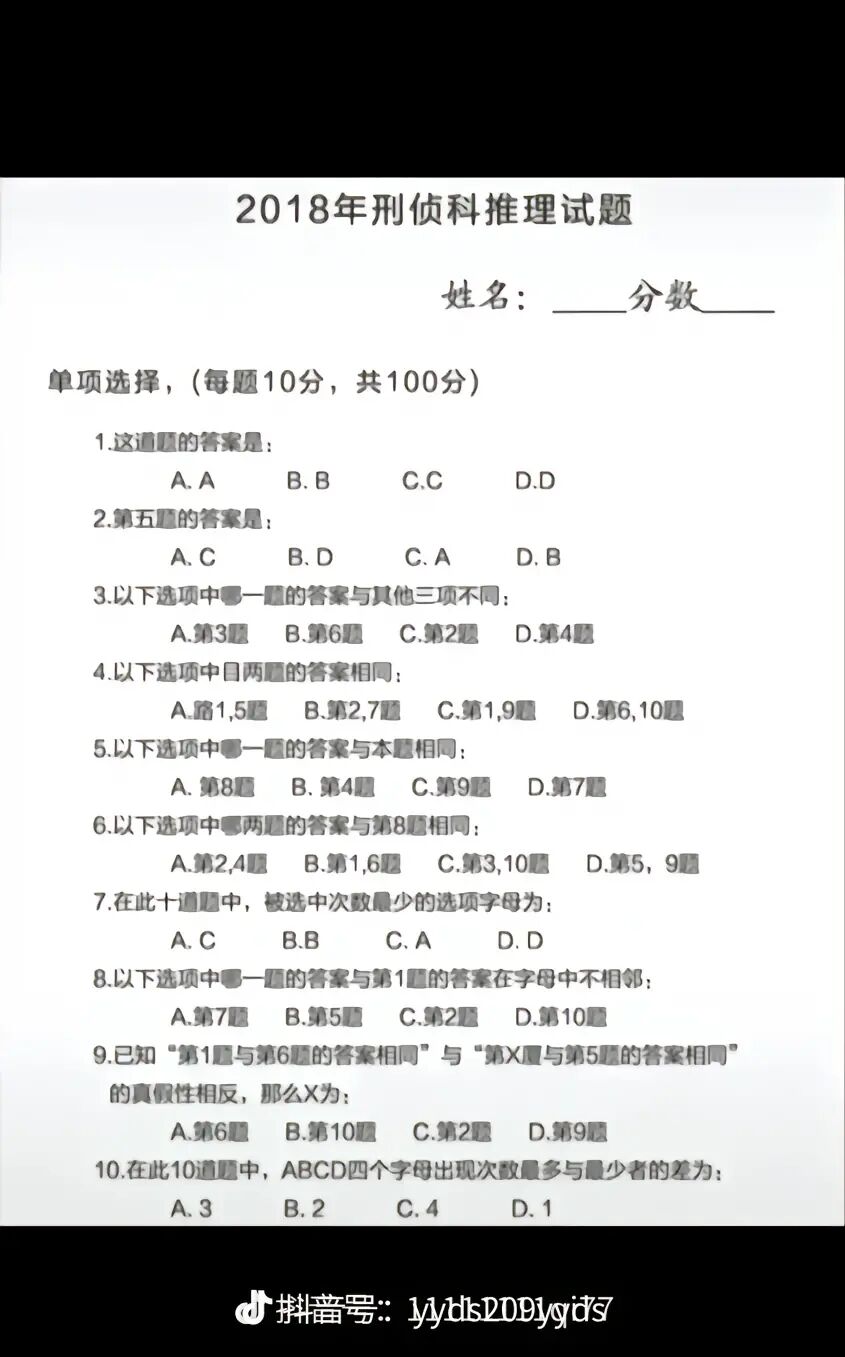2018年刑侦科推理试题
不难发现一题有四个选项,一共有十题
所以可能的答案一共有$4^{10}$即$2^{20}$约$1e6$
另外一个可能的答案判断需要$10$次
所以复杂度约为$n^k * k$
将$n = 4, k = 10$带入上式约为$1e7$所以暴力有解
另外,当做只有两个选项的题的时候可以用二进制枚举,四个选项其实也可以运用此法
例如:规定0->A 1->B 2->C 3->D
当前枚举的st为 10086
转化为二进制 -> 0000 0010 0111 0110 0110
按照两位划分开来-> 00 00 00 10 01 11 01 10 01 10
即表示当前的选项为 A A A C B D B C B C
然后进入check()
另外这题其实可以dfs暴力剪枝速度更快但是写起来也不容易
#include <iostream>
#include <cstring>
#include <algorithm>
using namespace std;
typedef long long LL;
bool check(LL st){
int option[10];
for (int i = 0; i < 10; i ++ )
option[i] = (((st >> ((i << 1) + 1)) & 1) << 1) + ((st >> (i << 1)) & 1);
if (option[2] == 0 && !(option[2] != option[5] && option[5] == option[1] && option[1] == option[3]))
return false;
else if (option[2] == 1 && !(option[5] != option[2] && option[2] == option[1] && option[1] == option[3]))
return false;
else if (option[2] == 2 && !(option[1] != option[2] && option[2] == option[3] && option[3] == option[5]))
return false;
else if (option[2] == 3 && !(option[2] != option[3] && option[2] == option[5] && option[5] == option[1]))
return false;
if (option[3] == 0 && !(option[0] == option[4]))
return false;
else if (option[3] == 1 && !(option[1] == option[6]))
return false;
else if (option[3] == 2 && !(option[0] == option[8]))
return false;
else if (option[3] == 3 && !(option[5] == option[9]))
return false;
if (option[4] == 0 && !(option[4] == option[7]))
return false;
else if (option[4] == 1 && !(option[4] == option[3]))
return false;
else if (option[4] == 2 && !(option[4] == option[8]))
return false;
else if (option[4] == 3 && !(option[4] == option[6]))
return false;
if (option[5] == 0 && !(option[1] == option[7] && option[1] == option[3]))
return false;
else if (option[5] == 1 && !(option[0] == option[5] && option[0] == option[7]))
return false;
else if (option[5] == 2 && !(option[2] == option[9] && option[2] == option[7]))
return false;
else if (option[5] == 3 && !(option[4] == option[7] && option[7] == option[8]))
return false;
int cnt[4];
memset(cnt, 0, sizeof cnt);
for (int i = 0; i < 10; i ++ )
cnt[option[i]] ++;
if (option[6] == 0 && !(cnt[2] < cnt[0] && cnt[2] < cnt[1] && cnt[2] < cnt[3]))
return false;
else if (option[6] == 1 && !(cnt[1] < cnt[0] && cnt[1] < cnt[2] && cnt[1] < cnt[3]))
return false;
else if (option[6] == 2 && !(cnt[0] < cnt[1] && cnt[0] < cnt[2] && cnt[0] < cnt[3]))
return false;
else if (option[6] == 3 && !(cnt[3] < cnt[0] && cnt[3] < cnt[1] && cnt[3] < cnt[2]))
return false;
if (option[7] == 0 && !(option[6] + 1 != option[0] && option[6] - 1 != option[0]))
return false;
else if (option[7] == 1 && !(option[4] + 1 != option[0] && option[4] - 1 != option[0]))
return false;
else if (option[7] == 2 && !(option[1] + 1 != option[0] && option[1] - 1 != option[0]))
return false;
else if (option[7] == 3 && !(option[9] + 1 != option[0] && option[9] - 1 != option[0]))
return false;
int res = 0;
res += option[0] == option[5];
if (option[8] == 0)
res += option[5] == option[4];
else if (option[8] == 1)
res += option[9] == option[4];
else if (option[8] == 2)
res += option[1] == option[4];
else
res += option[8] == option[4];
if (res % 2 == 0)
return false;
int maxv = *max_element(cnt, cnt + 4);
int minv = *min_element(cnt, cnt + 4);
int v = maxv - minv;
if (option[9] == 0 && v == 3)
return true;
else if (option[9] == 1 && v == 2)
return true;
else if (option[9] == 2 && v == 4)
return true;
else if (option[9] == 3 && v == 1)
return true;
return false;
}
int main()
{
LL st;
for (st = 0; st <= 1 << 20 ; st ++)
if (check(st))
break;
int option[10];
for (int i = 0; i < 10; i ++ )
option[i] = (((st >> ((i << 1) + 1)) & 1) << 1) + ((st >> (i << 1)) & 1);
for (auto x: option)
cout << (char)(x + 'A') << ' ';
puts("");
return 0;
}


